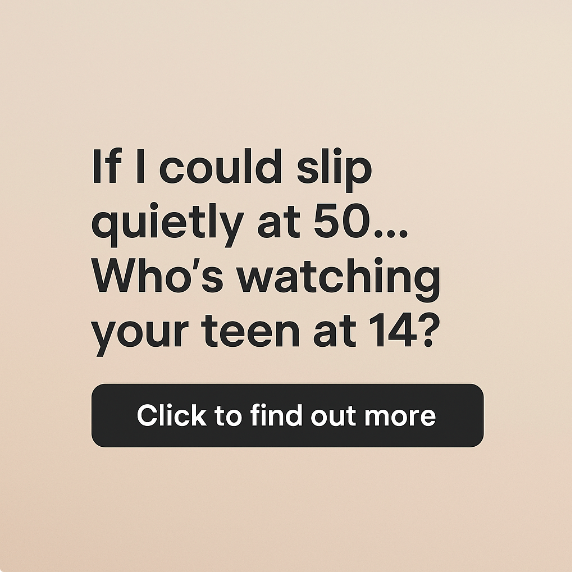If I Can Drift at 50, What’s Happening to Our Teens at 14?
When Cannabis Becomes a Quiet Crutch: A Father’s Honesty, a Society in Denial, and Why Our Teens Need Us Awake
I believe one of the biggest mistakes the Canadian government ever made was legalizing cannabis.
Not because no one should ever use it. Not because I think everyone who does is an addict. But because legalization didn’t just make it accessible, it made it acceptable. It turned a drug into a “mood enhancer,” a “sleep tool,” a “creative lift,” a “mental health aid.” It walked into our daily lives wearing the disguise of wellness. And millions of us, hurting, stressed, grieving, restless, opened the door without realizing what we were really letting in.
Growing up, I didn’t have much interest in weed. I played rugby. Beer was our drug of choice, and yes, we went too far often. It was part of our identity. Cannabis wasn’t a big part of my story.
That changed, not when it became legal, but when grief made me vulnerable enough to want something to numb the edges.
When my daughter Maddie died by suicide in 2015, my world collapsed. I spiralled hard into alcohol for a few months. It was an escape, until I realized alcohol didn't numb my grief, it amplified my depression. A couple of drinks could send me into a dark hole for days. So I started quitting for weeks and months at a time, then returning, then quitting again. In August 2023, I stopped entirely, because I hated how dark it made me feel. I truly saw the impact alcohol had as a depressant. Having even one drink, wasn’t worth the consequences. So I quit, and it was easy for me.
But when you carry trauma, your brain is always on the lookout for something, anything, that offers a break from pain, even momentarily.
That’s when cannabis slipped in, quietly, almost rationally.
It started with gummies I made myself to help with sleep. And it worked. For the first time in years, I slept through the night. Then I began taking them socially. Then I smoked occasionally because I convinced myself it helped me relax. Then, I thought it made me write with more creativity. Some blogs I wrote while high went viral, and I secretly started treating THC like a performance enhancer. Soon I was walking into dispensaries like they were pharmacies, asking for strains to boost energy, creativity or inspiration. And someone behind the counter always had the “perfect” recommendation.
I didn’t believe I was addicted, but I could feel a quiet pull toward dependency that frightened me.
Because I wasn’t just using it to sleep anymore. I was using it to soften the harder parts of my mind. Over time, I noticed my memory wasn’t as sharp. I felt emotionally dull. I cancelled plans more often. I withdrew. Then THC started triggering depressive crashes like alcohol once had. I could feel something shifting, and I didn’t like where it was heading.
I’m not telling this story as some reformed hero who “figured it out.” This is not me saying, “Clean up your act like I did.” This isn’t a sermon. In fact, the hardest part wasn’t quitting, it was admitting to myself that I was quietly drifting toward something that didn’t align with who I wanted to be.
Because once you start questioning your relationship with something, shame often shows up right behind it. People get judgmental. They see any admission of struggle as weakness. Especially if you’re a dad, a business owner, a mentor, someone who appears strong. So you stay silent and keep using, not excessively, but regularly enough to avoid facing what’s underneath.
But I’ve learned that self-awareness isn’t weakness, it’s strength. If another father, teacher, leader or mentor reads this and quietly thinks, “I know exactly what he’s talking about, I’ve felt that pull too,” that doesn’t make them broken. That makes them honest. Lived experience doesn’t make us hypocrites. It makes us human.
That includes me. Being a father, mentor, and creator of The MentorWell does not make me immune to struggle. It makes me accountable to recognize it in myself so I can better walk alongside those facing similar battles. If I can’t admit my own vulnerability, I have no right asking a teen to confront theirs.
That’s why I stopped, because I didn’t want to drift further from the things that matter most: my boys, Maddie’s legacy, my purpose, my clarity.
Now, almost two months later, I feel more mentally present than I have in years.
What scares me more than anything, if I could start sliding quietly in my 50s, what’s happening to our teens at 14?
Teens who are lonely, anxious, overstimulated, overwhelmed, grieving silently. Those who don’t understand the complexity of their emotions. Teens who are being told that THC is self-care. That numbness is peace. That checking out is coping.
That is why The MentorWell exists.
Not to preach. Not to judge. But to walk with young people before they drift toward something to fill a void they can’t name. It exists because when adults are barely hanging on, we can’t expect teens to self-navigate emotional storms alone.
I’m still healing, but I’m healing wide awake and with a clear mind now.
And that’s what I want for our teens, too.


